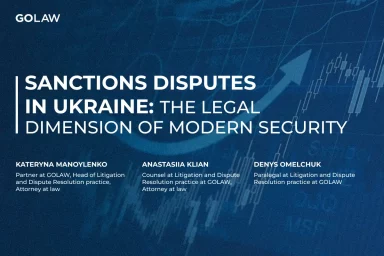A new stage in the regulation of virtual assets in Ukraine: what is changing for businesses and investors
Contents
On 3 September, the Verkhovna Rada of Ukraine adopted in the first reading draft law No. 10225-d on a new stage in the regulation of virtual assets, which is intended to bring Ukrainian legislation closer to EU standards and establish transparent rules for businesses and investors.
The document provides for amendments to the Tax Code of Ukraine, the Law of Ukraine “On Advertising”, the Law of Ukraine “On Currency and Currency Transactions”, and a number of other regulatory acts.
Among the key changes is an updated version of a special law, which is proposed to be renamed “On Virtual Asset Markets”. This approach correlates with established practice in the field of financial law, in particular with the Law of Ukraine “On Capital Markets and Organized Commodity Markets”.
In other words, the legislator is trying to unify the terminology and structure of regulation: just as there is a comprehensive law to regulate capital markets, a similar “systemic” act is proposed for virtual assets.
New definition and classification of virtual assets
The draft law proposes an updated definition of the term “virtual asset”. A virtual asset is defined as a type of digital thing that is created, transferred, and stored in electronic form using distributed register technology or other similar technology.
Virtual assets acquire the status of movable property within the meaning of the Civil Code of Ukraine, except in cases where otherwise expressly stated. This means that they can be subject to ownership, inheritance, or other civil law relationships.
At the same time, the draft law explicitly states that virtual assets are not money and cannot be used as an official means of payment in Ukraine. In other words, payments in cryptocurrency for goods or services are not permitted, except in cases specifically provided for by law.
Separately, the legislator emphasizes that the digital money of the National Bank of Ukraine (e-hryvnia) does not fall under the category of virtual assets. This provision distinguishes between state digital currency and private tokens.
The draft law also provides for the division of virtual assets according to the model enshrined in the European MiCA regulation into:
- asset-backed tokens;
- e-money tokens; and
- other categories of virtual assets.
Taxation of crypto asset transactions
The draft law pays special attention to the taxation of virtual asset transactions.
Individuals will pay tax on the difference between the income from the sale and the cost of purchasing digital assets during the year, and will independently declare and pay personal income tax. It is important to understand that only the portion of income that is converted into fiat money will be taxed.
At the same time, a number of exceptions have been identified that will not be subject to taxation.
In particular, the following will not be taxed:
- transactions involving the exchange of one virtual asset for another;
- the sale of virtual assets within the limits of one minimum wage per year; and
- assets acquired before the relevant law came into force, a preferential personal income tax rate of 5% is envisaged in 2026. Starting from the next period, the standard rate of 18% will apply, taking into account an additional military levy of 5%.
With regard to corporate income tax, the draft law provides for the introduction of new tax differences to adjust the financial result before taxation. This approach is implemented by analogy with the procedure for taxation of securities transactions. It is expected that the list of expenses that can be taken into account when conducting transactions with virtual assets will be approved by the Ministry of Finance of Ukraine on the basis of a submission from the financial market regulator. Transactions with virtual assets will be prohibited for single tax payers. Providers of services related to the circulation of such assets will not be entitled to use the simplified taxation system.
New market requirements: regulator and obligations for businesses
The draft law defines a general two-tier system of regulation and supervision of the virtual asset market. The National Bank of Ukraine (NBU) will definitely be one of the regulators.
The second regulator is to be a specially designated state body, but it has not yet been finally decided who will perform this role. The question of determining the regulator remains open and should be agreed upon before the second reading.
Licensing of service providers in the field of virtual assets (in particular, exchanges, exchangers, wallet providers) will also undergo changes and will involve strict regulatory requirements and increased control by the state.
The draft law proposes to establish clear requirements for the organizational and legal form of entities operating in the field of virtual asset circulation in Ukraine. Such companies must be registered in Ukraine as joint-stock companies or limited liability companies. Mandatory conditions include location in Ukraine, at least one resident director, and ensuring that the company’s activities are actually managed from Ukraine.
Businesses working with virtual assets will be required to implement anti-money laundering (AML) procedures in accordance with the requirements of the law. This includes basic customer identification (KYC), transaction monitoring, and reporting of suspicious transactions, which is part of harmonization with EU requirements (in particular, EU directives on anti-money laundering (AMLD) and MiCA regulations).
Crypto exchanges registered abroad will be able to operate in Ukraine only if they undergo a simplified authorization procedure in Ukraine and if they are based in the EU (or other countries permitted by the regulator).
The draft law pays particular attention to regulating advertising of virtual assets and related services. To this end, it proposes adding a new article to the Law of Ukraine “On Advertising”, establishing special requirements and prohibitions for advertising on the crypto market. The goal is to protect consumers from misleading or dangerous advertising (e.g., pyramid schemes, fake tokens, etc.) and to prevent misconceptions about the legal status of cryptocurrencies.
Benefits of the new regulations for businesses and investors
Draft Law No. 10225-d signals Ukraine’s transition to a civilized virtual asset market. Tax rules, transparent business requirements, and advertising – all these elements create a comprehensive framework for the development of the crypto industry based on legality and transparency. Businesses will get clear rules and the opportunity to operate openly, investors will get protection and information for decision-making, and the state will get tax revenues and control over risks.
In general, the ideology of the bill is consistent with the approaches of the EU MiCA (Markets in Crypto-Assets) Regulation, adopted in the spring of 2023. Ukrainian officials openly refer to MiCA, taking into account the European classification of tokens and requirements for white papers and AML/KYC.
Given Ukraine’s commitments within the framework of European integration, the implementation of MiCA principles into national legislation is not only expected but also necessary. Taking into account the provisions of this Regulation is a prerequisite for the gradual harmonization of the Ukrainian virtual asset market with European Union law.
Ahead lies the stage of finalization and second reading. At this stage the document traditionally undergoes a large number of amendments. Therefore, it is important for businesses and investors to closely monitor the work of parliament so as not to miss key changes and adapt in a timely manner. But the general direction is clear: Ukraine wants to be among the progressive jurisdictions that do not ban but sensibly regulate the circulation of cryptocurrencies.

Oleksandr Melnyk
Partner, Head of Corporate Law and M&A practice, Attorney at law
- Contacts
- 31/33 Kniaziv Ostrozkykh St, Zorianyi Business Center, Kyiv, Ukraine, 01010
- o.melnyk@golaw.ua
- +38 044 581 1220
- Recognitions
- The Legal 500 2024
- IFLR1000 2024 (International Financial Law Review)
- Legal 500 Green Guide 2024
- TOP-50 Law Firms of Ukraine Ranking | YURPRAKTYKA
Get in touch
To get a consultation, please fill out the form below or call us right away:Sign up to be aware
New achievements are inspired by information. GO further, don’t miss out GOLAW news and legal alerts
Our expertise
-
- Energy and Natural Resources
- Antitrust and Competition
- Banking and Finance
- Compliance, Corporate Governance and Risk Management
- Corporate and M&A
- Criminal and White Collar Defence
- Defense in Anti-corruption procedures and regulations
- Labor and Employment
- Natural Resources and Environment
- Government Relations (GR)
- Insolvency and Corporate Recovery
- Intellectual property
- International trade
- Legal support of business and private Сlients in Germany
- Litigation and dispute resolution
- Private clients
- Real Estate and Construction
- Restructuring, Claims and Recoveries
- Martial Law
- Tax and Customs
-
- Agribusiness
- Aviation
- Chemical industry
- Engineering, Construction and Building Materials
- Natural Resources and Environment
- Financial institutions
- IT and AI
- Industry and manufacturing
- Healthcare industries, Life sciences and Pharmaceuticals
- Media, Entertainment, Sports and Gambling
- Retail, FMCG and E-Commerce
- Transport and Logistics
We use cookies to improve performance of our website and your user experience.
Cookies policy
Cookies settings







